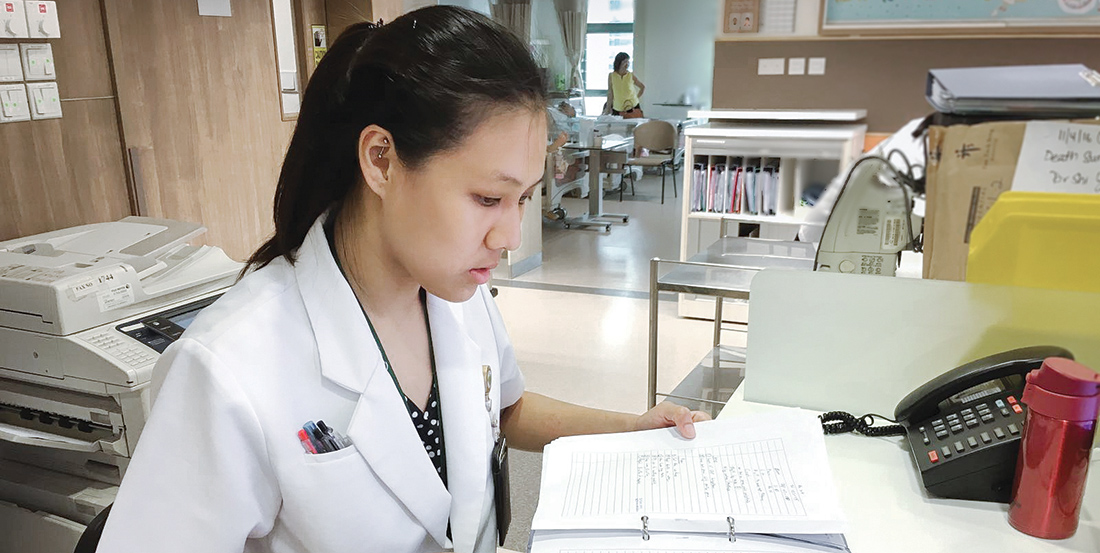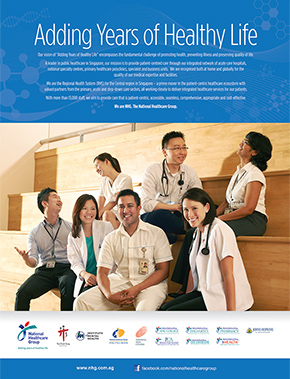T he National Healthcare Group (NHG) is a leader in public healthcare in Singapore. As a Regional Health System, NHG provides care through an integrated network and collaborates with Hospitals, Specialty Centres, Polyclinics, Patients, Caregivers, Partners, Volunteers and the Community to Add Years of Healthy Life to the nation. As Singapore faces a rapidly ageing population and more people developing chronic diseases, the doctor-centric service needs to give way to a multi-disciplinary approach – a new model of care that moves beyond treating illness to promoting healthy lifestyle habits and enhancing wellness care. To meet the rising healthcare demands from a growing and rapidly ageing population, greater demand for quality healthcare professionals including nurses and allied health professionals like occupational therapists is set to increase.
The fundamental purpose of occupational therapy is to develop and maintain a person’s capacity throughout life, in order for them to perform day-to-day tasks in spite of an injury, illness or disability. Join Healthcare Scholar Lim Zhenxi Cherish as she talks about her role as an occupational therapist, the challenges she faces and what she finds most fulfilling about her job.

Lim Zhenxi Cherish
Healthcare Scholar
Occupational Therapist, Tan Tock Seng Hospital
What sparked your interest in healthcare?
Cherish Lim: I have always been fond of marine life since young and actually wanted to be a marine biologist. But as I got older, I realised that what I really wanted to do was to make positive change in the lives of others. So I found myself being drawn to the healthcare industry. Although there was no particular catalyst that inspired me to join this field, my personal philosophy seems to resonate well with what the healthcare field stands for.
Why did you choose occupational therapy?
Cherish: While researching on the different allied health professions and their respective job scopes, I was intrigued by the job description of an occupational therapist. I remember reading this particular liner – “Occupational Therapists design activities to facilitate performance of important daily activities and to improve health”. Even though I could not fully appreciate what the description meant then, it struck a chord with me. I thought to myself that this was something meaningful and most importantly, something I can see myself doing for a long time.
Share with us a bit about your role.
Cherish: Occupational therapists work with people of different ages, diagnoses and in a variety of settings. My role in the acute hospital involves assessments, discharge planning, and goal setting with patients or their families as well as the provision of rehabilitation. When patients are referred to us, we assess their ability to cope with their daily activities and decide what kind of services they would require in order to improve their condition. We also make referrals to other community services – for example, to a community hospital for further rehabilitation or home help services to assist seniors who are staying alone so they are able to live safely and independently in the community.

What are some of the challenges that you face?
Cherish: As I work within a multi-disciplinary team, clear and effective communication is imperative to ensure optimum treatment outcomes and good discharge planning for patients. Often, misunderstanding of others’ intentions stems from poor communication. This causes delays in patients’ discharge plans and prolongs their hospital stay unnecessarily or results in ambiguous goals for therapy. The fast-paced nature of an acute hospital means that plenty of information gets circulated within the team quickly and sometimes details can get left out. For me, I think it is important to clarify information when in doubt and to speak in a clear and professional way so that others can understand where you are coming from.
What would you say is the most fulfilling part of your job?
Cherish: I don’t think that there has been a day where I have not been touched by at least one patient or an incident at work. Just recently, I was on a home visit to assess an elderly patient’s ability to buy food with his new motorised scooter. The patient had a fall, broke his hip and had a surgery done. During his time at the community hospital for rehabilitation, he had an infection and was sent back to Tan Tock Seng Hospital for medical treatment. He lamented that it had been a long time since he had been out and about. In fact it took six months after his admission before he could actually leave the house on his own. While it may not seem like a great deal to others, I was very touched by his perseverance and patience. It made my day thinking that I played a part in his journey to recovery.
What advice do you have for aspiring healthcare scholars?
Cherish: Do your homework – read up on the terms of scholarships and ask questions. Be certain that this is where your passion lies before you make a decision. Remember, a scholarship is worth more than just its monetary value. So take your time to discern if the opportunities that lie before you are what you desire.

